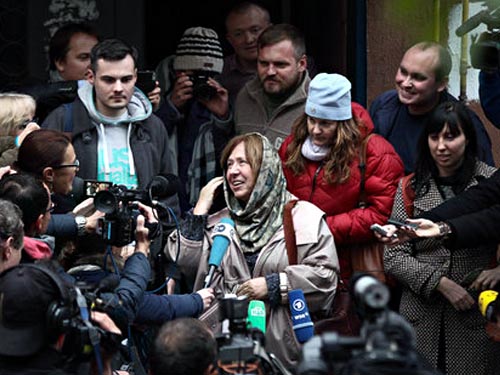Poland and Germany were both initiators and drivers of a New Eastern policy linked to the Eastern neighborhood and Russia/Soviet Union.
Svetlana Alexievich: The Nobel Prize is not only mine; it’s our common humanitarian

For Belarus, its own Nobel Prize winner is more interesting than the so-called “elections”. “Nasha Niva’s” editorial office wasn’t able to accommodate all who came to Alexievich’s Nobel conference.
According to the idea of the Swedish PEN center, Svetlana Alexievich has been nominated for the Nobel Prize in Literature since 2002 for the series of works “Voices of the Utopia”. Last year Alexievich was the front winner among bookmakers, but it didn’t happen. On October 8, 2015 the Swedish Academy awarded Belarusan writer Svetlana Alexievich the Nobel Prize in Literature “for her polyphonic writings, a monument to suffering and courage in our time”.
Svetlana Alexievich arrived to the place accompanied by the Swedish Ambassador Martin Oberg, who confessed to the EuroBelarus Information Service that he hasn’t read the writer’s books, even though he has them at home. “I will read them within the next few days, I think,” say the diplomat, adding that the Nobel Prize that Alexievich won would make Belarus more famous around the world.
Svetlana Alexievich didn’t hide her tears. Though, noted the writer, a million dollars don’t excite her too much; according to her, the money is only important as a means of additional freedom for working over new books. She believes that the Nobel Prize is a prize for all Belarusans. “I wish Belarusans had pride. I didn’t do it myself — these are my heroes, my parents, my grandfather, and my great-grandfather, who studied together with Yakub Kolas. This is some common humanitarian heritage that has happened. And I don’t accept that this is only mine. I am very happy that we are together.”
The question that is often discussed in relation to the Russian-speaking Alexievich, who was born in Ukraine, but grew up and lives in Minsk (after quite a long European period) — whose writer is she? This is the answer of the Nobel Prize winner: “I can say that I feel like a person of a Belarusan world, a person of Russian culture with a powerful inoculation of Russian culture, and a person, who has been living in the world for a long time — a cosmopolitan, of course.”
Alexievich also feels close to the “Russian World”, but the world that is represented by Russia’s cultural elites: “I don’t like the world of Beria, Stalin, Putin, Shoigu — this is not my world.”
As the interview was taken on the eve of the presidential elections, Svetlana Alexievich commented on that saying that she won’t vote, since “we know, who will win”: “We know that Lukashenko will win. Probably, he will get 76%. I think so. He will look at the moods in the society and calculate how much he can get.” The “winner” of the elections is known, assumes Alexievich, since “the people got afraid of the war, afraid of what’s happened in Ukraine and what is happening in Syria now.” “You know, the war is terrifying. And our people don’t want to take weapon. And I am happy, because I am not a supporter of revolutions. I think that a long way is still awaiting us; we won’t be free any time soon. We are very small; we are squeezed from all the sides and we are a poor country. We are very uncoordinated; each of us sits in his own house and doesn’t want to leave it. Look, what did Ukrainians turned out to be,” said Alexievich.
Belarus’ trouble is in its “Soviet nature”. “The general level of political elites is Soviet, and even worse. In Soviet union there were frames that weren’t violated,” said Alexievich, recalling about the Belarusan ministers of culture, among whom are “some constructors, graduates of vocational school, and who’s not.”
However, emphasized Svetlana Alexievich, she doesn’t have catastrophic disappointment in Belarusans: “No, I like Belarusans — these are my parents, my father is a Belarusan, and so are my grandfather and grandmother. I have been living in the village for a long time; I loved village and love it very much even now. Well, I love Belarusans. But, unfortunately, I don’t expect close changes. And that’s why, I think, we need to do our business calmly and quietly. We don’t have any other choice.”
Others
-
Uladzimir Matskevich: The sooner the "Union State" is denounced, the better for Belarus
Not only does the “Union State” undermine the establishment of civilized relations with Europe, but it hinders the possibility of normal relations between Belarus and Russia.
-
Uladzimir Matskevich: The regime can no longer control the situation in the country
The authorities are unable to prolong the social contract with the people: there is no way out of the social crisis.
-
Press release of the BNP in connection with the next round of the dialogue in the format of the EU-Belarus Coordination Group
Belarusan National Platform of the Eastern Partnership Civil Society Forum welcomes the dialogue process in the format of the EU-Belarus Coordination Group, the third round of which was held in Minsk on 3-4 April 2017.
-
Hennadiy Maksak: Europe must react adequately to the events in Minsk
A new wave of political repressions should make the EU return to tougher policy towards the Belarusan regime.








Comments
From farewell to a new Eastern policy and towards a new development
Poland and Germany were both initiators and drivers of a New Eastern policy linked to the Eastern neighborhood and Russia/Soviet Union.